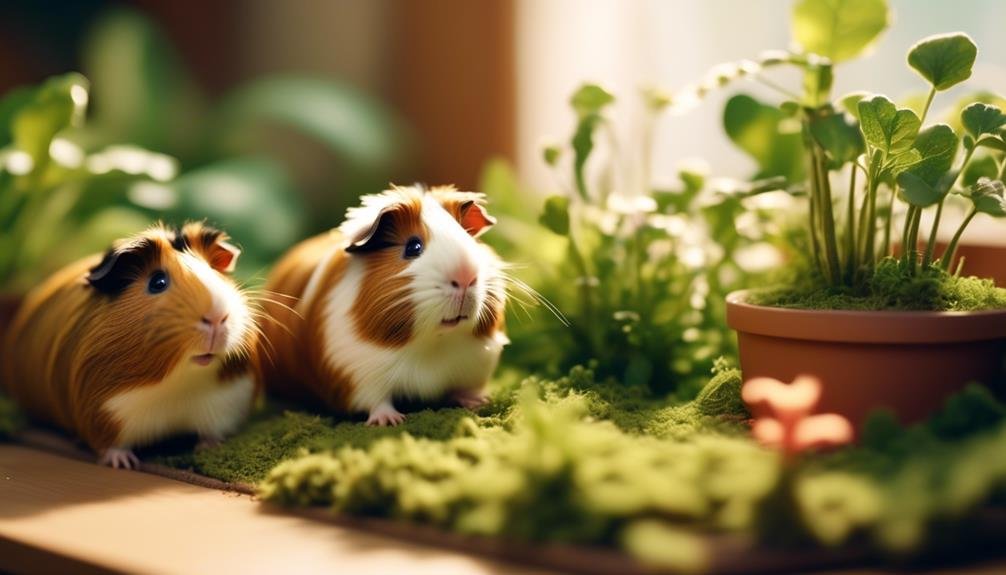
The world of American Guinea Pigs is a captivating one, filled with charm and endearing qualities that have made these creatures beloved companions to pet enthusiasts worldwide. Originating from the Andes Mountains of South America, their history is rich and intriguing, reflecting a fascinating journey that has led them to become recognized by the esteemed American Cavy Breeders Association.
But what sets these guinea pigs apart from others? What makes them so friendly and docile, captivating the hearts of their owners? And how can we ensure their well-being and happiness?
In this discussion, we will explore the many facets of the charming world of American Guinea Pigs, from their unique coat types to their social nature, offering insights and tips that will leave you eager to learn more.
Key Takeaways
- American Guinea Pigs are a popular choice for pets due to their friendly and docile nature.
- They come in various coat types, colors, and patterns, making them visually appealing.
- They require a spacious cage, proper bedding, access to fresh water, and a balanced diet for their housing and environment.
- American Guinea Pigs are highly social animals that thrive in pairs or small groups and enjoy gentle handling and interaction with their owners.
Origin and History
The American Guinea Pig breed has a rich history that can be traced back to the Andes Mountains of South America. These small rodents, scientifically known as Cavia porcellus, were originally domesticated by the indigenous people of Peru, Bolivia, and Ecuador for their meat and fur. The guinea pigs were highly valued and even played a significant role in religious ceremonies and traditional healing practices.
With the arrival of European explorers in the 16th century, guinea pigs were introduced to Europe and gradually spread across the globe. Today, they are popular pets worldwide, known for their friendly and docile nature.
The American Guinea Pig breed is recognized by the American Cavy Breeders Association (ACBA) and comes in a variety of coat types, including short, long, and curly.
Lifespan and Coat Types

With an average lifespan of 5-7 years, American Guinea Pigs are known for their varying coat types. These adorable pets come in a variety of fur lengths, including short, long, and curly, making them a visually appealing choice for pet owners.
The American Cavy Breeders Association (ACBA) recognizes the different coat types and encourages breeders to maintain the standards for each variety. Whether you prefer a sleek and smooth coat or a fluffy and curly one, American Guinea Pigs offer a range of options to suit your aesthetic preferences.
Their diverse coat types add to their charm and make them a popular choice among pet enthusiasts.
Recognition by ACBA

After establishing their reputation for diverse coat types, American Guinea Pigs garnered recognition from the American Cavy Breeders Association (ACBA). The ACBA is a prestigious organization dedicated to promoting and preserving the standards of guinea pig breeding. This recognition is a testament to the breed’s quality and adherence to established standards.
The ACBA recognizes American Guinea Pigs based on various factors such as coat type, color, and overall conformation. This recognition not only adds to the breed’s credibility but also provides breeders and enthusiasts with a platform to showcase their American Guinea Pigs in competitions and shows. It also ensures that breeders maintain the highest standards of care and breeding practices.
Being recognized by the ACBA is a significant achievement for American Guinea Pigs and showcases their importance in the world of guinea pig breeding.
Friendly and Docile Nature

American Guinea Pigs are known for their amiable and gentle temperament, making them popular pets among individuals of all ages. Their friendly and docile nature is one of the main reasons why they are beloved companions.
Here are three key aspects of their temperament that make them such delightful pets:
- Affectionate Companionship: American Guinea Pigs are highly social animals that enjoy gentle handling and interaction with their owners. They form strong bonds with their caretakers and thrive on companionship.
- Calm and Easygoing: These guinea pigs have a naturally calm disposition, making them easy to handle and care for. They are generally not prone to aggression and are known for their peaceful nature.
- Tolerant and Patient: American Guinea Pigs are known to be patient and tolerant of children and other pets. Their gentle demeanor makes them ideal companions for households with multiple animals or young children.
With their friendly and docile nature, American Guinea Pigs bring joy and warmth to any home.
Compact Body Shape
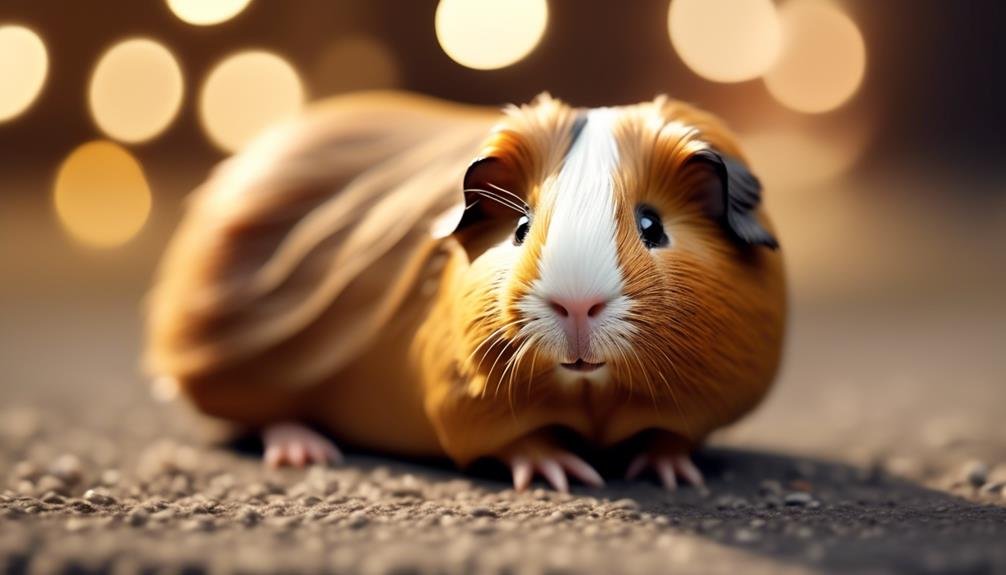
One notable aspect of American Guinea Pigs is their compact body shape, which contributes to their overall charm and uniqueness. These small creatures have a rounded and compact body, weighing between 1.5 to 2.5 pounds. Their small and rounded ears, along with their large and expressive eyes, further enhance their adorable appearance. To provide a visual representation of their physical characteristics, refer to the table below:
| Physical Characteristics | |
|---|---|
| Body Shape | Compact and rounded |
| Weight | 1.5 to 2.5 pounds |
| Ears | Small and rounded |
| Eyes | Large and expressive |
| Coat Colors and Patterns | Wide variety |
The compact body shape of American Guinea Pigs not only adds to their visual appeal but also makes them easier to handle and care for. Their size allows them to fit comfortably in cages and provides a sense of security when interacting with their owners.
Weight and Physical Features
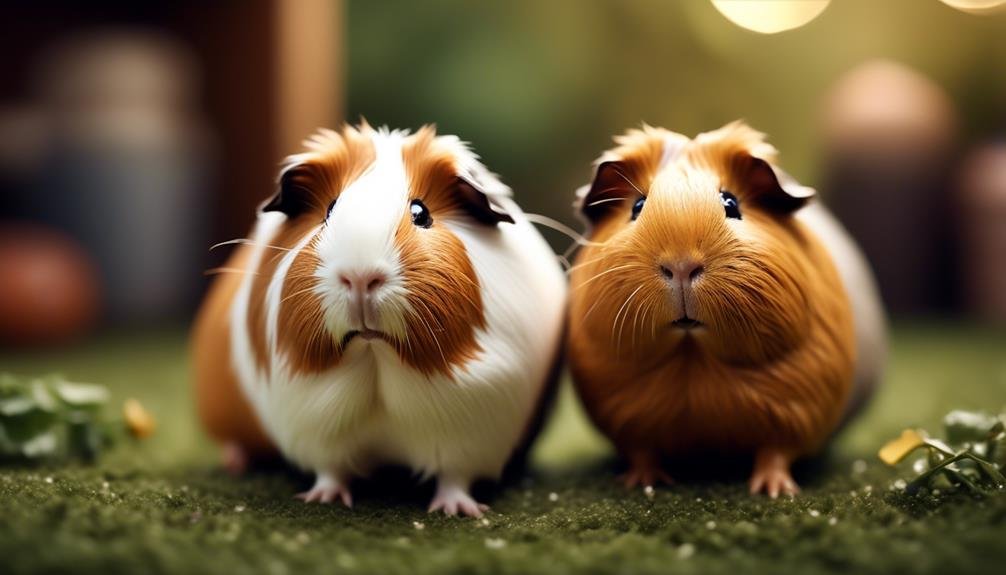
The weight and physical features of American Guinea Pigs contribute to their distinct characteristics and appeal as pets. Here are some key points to know about their weight and physical traits:
- American Guinea Pigs have a compact and rounded body shape, which gives them a cute and huggable appearance.
- They typically weigh between 1.5 to 2.5 pounds, making them small and manageable pets.
- Their small and rounded ears add to their adorable look, while their large and expressive eyes give them a captivating and endearing expression.
- American Guinea Pigs come in a wide variety of coat colors and patterns, adding to their visual appeal and uniqueness as pets.
These physical features, combined with their friendly and docile nature, make American Guinea Pigs an attractive choice for pet owners seeking a lovable and charming companion.
Variety of Coat Colors and Patterns
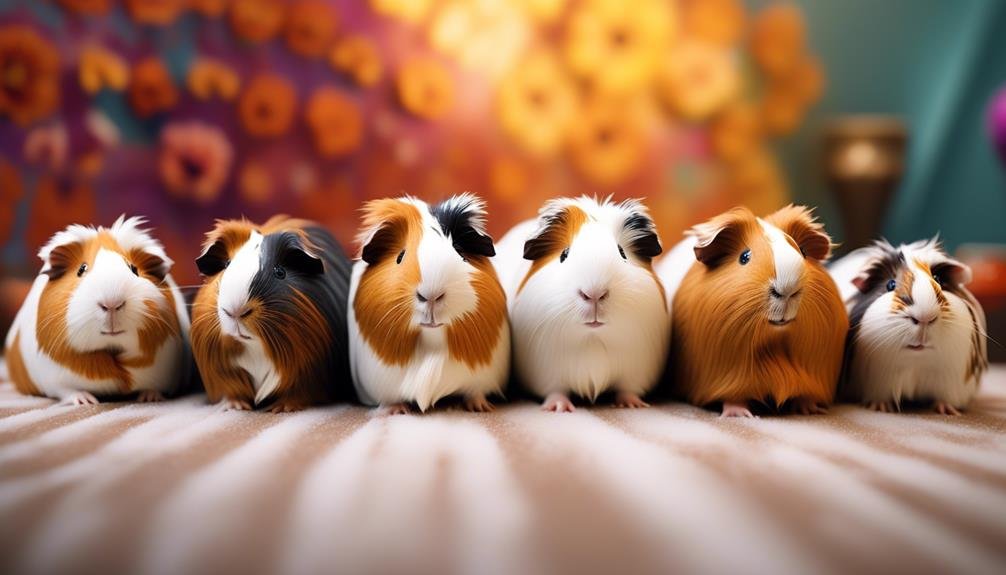
Continuing our exploration of the captivating characteristics of American Guinea Pigs, we now turn our attention to the captivating variety of coat colors and patterns they possess.
These charming creatures come in a wide array of colors, including black, white, brown, tan, and combinations of these hues. Additionally, their coats can exhibit various patterns such as solid, agouti, roan, tortoiseshell, and brindle.
Some American Guinea Pigs even have striking markings like spots or patches, adding to their visual appeal. The diverse coat colors and patterns make each guinea pig unique and allow owners to choose a pet that suits their personal preferences.
Whether it’s a solid black guinea pig or a multi-colored one with distinctive markings, these adorable creatures never fail to capture our attention with their delightful appearances.
Cage Size and Setup
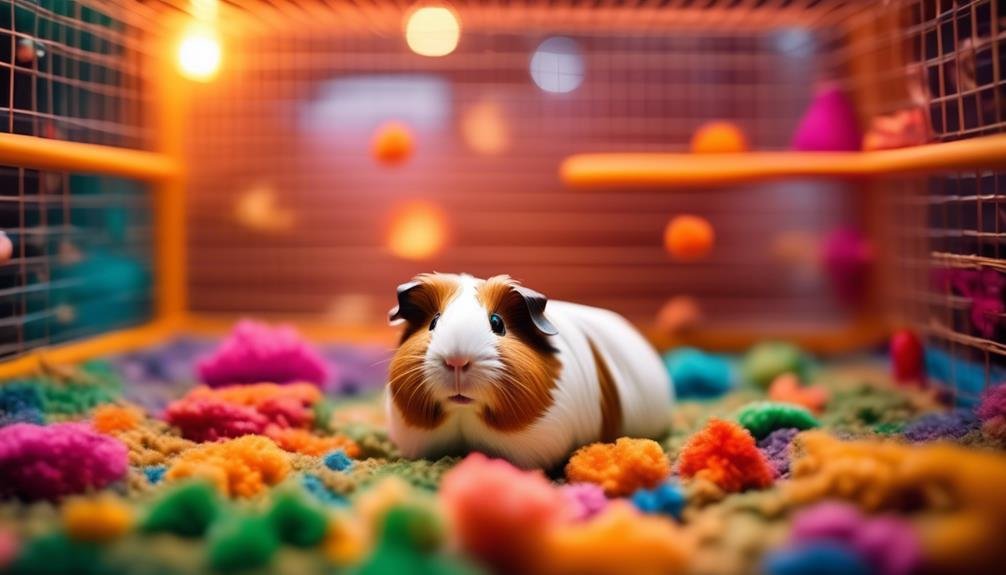
Guinea pigs require a spacious cage that provides ample room for their movement and comfort. When setting up a cage for your American Guinea pig, keep the following factors in mind:
- Size: The cage should be at least 7.5 square feet for one guinea pig, with additional space for each additional pig. Bigger is always better when it comes to cage size.
- Flooring: Opt for solid flooring rather than wire mesh, as it can cause injury to their delicate feet.
- Bedding: Use safe materials such as paper or aspen shavings for bedding, avoiding cedar or pine which can be harmful to their respiratory system.
- Accessories: Provide hiding spots, tunnels, and toys to stimulate their mental and physical well-being.
- Cleaning: Regularly clean the cage to maintain hygiene and prevent odors.
- Location: Place the cage in a quiet, draft-free area away from direct sunlight and extreme temperatures.
- Safety: Ensure the cage has secure latches and is escape-proof to prevent accidents.
Safe Bedding and Temperature
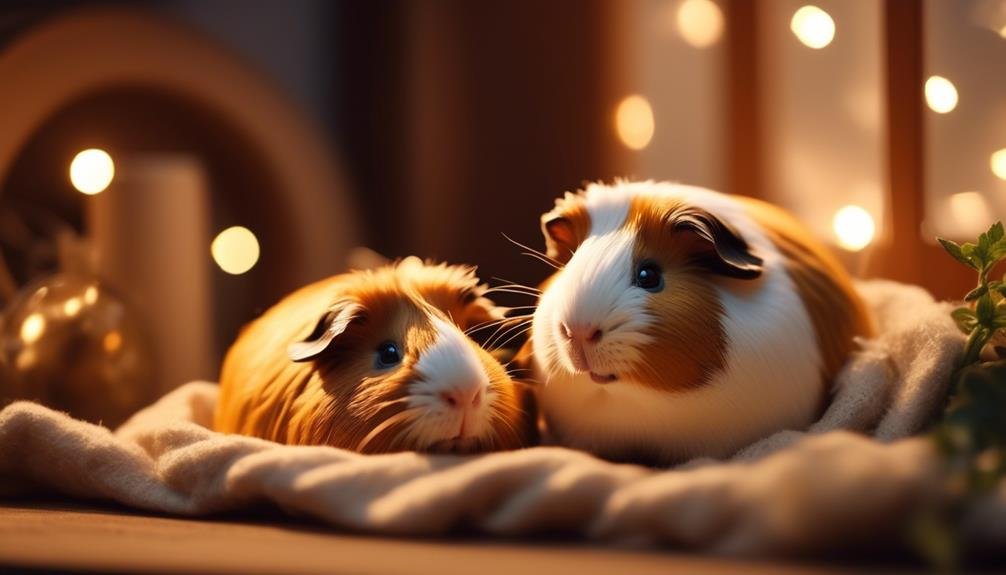
When providing bedding for your American Guinea pig, it is important to choose safe materials that promote their comfort and well-being. Opt for bedding made from paper or aspen shavings, as these materials are non-toxic and won’t harm your pet if ingested. Avoid using cedar or pine shavings, as they can release harmful chemicals and irritate your guinea pig’s respiratory system.
Additionally, maintain a suitable temperature range of 65-75°F (18-24°C) in their environment. Guinea pigs are sensitive to extreme temperatures, so it is crucial to provide them with a comfortable and stable climate. Make sure to place their cage away from drafts and direct sunlight, as these can also impact their well-being.
Balanced Diet and Fresh Water
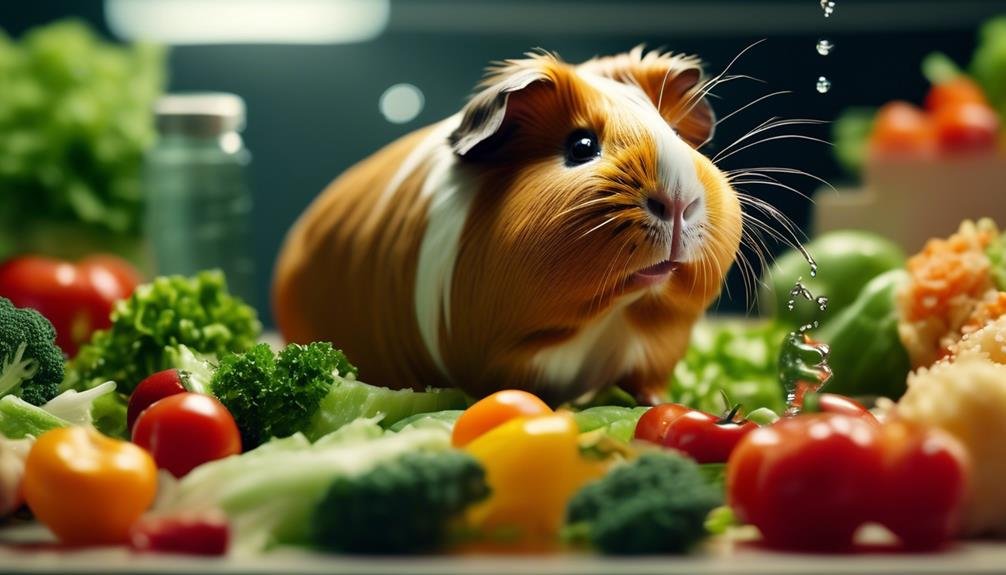
To ensure optimal health and nutrition for your American Guinea pig, it is essential to provide them with a well-balanced diet and access to fresh water. Here are three key points to consider:
- Hay: A staple of their diet, hay provides essential fiber and helps maintain healthy teeth. Timothy hay is recommended for adult guinea pigs, while alfalfa hay is suitable for young ones.
- Pellets: Choose high-quality, fortified pellets specifically formulated for guinea pigs. These pellets should make up a small portion of their diet to ensure they receive essential nutrients.
- Vegetables: Offer a variety of fresh vegetables daily, such as leafy greens (e.g., spinach, kale), bell peppers, and carrots. These provide additional vitamins and minerals.
Remember to always have fresh water available in a clean water bottle or dish. Avoid using water with added flavors or sweeteners.
Toys and Mental Stimulation
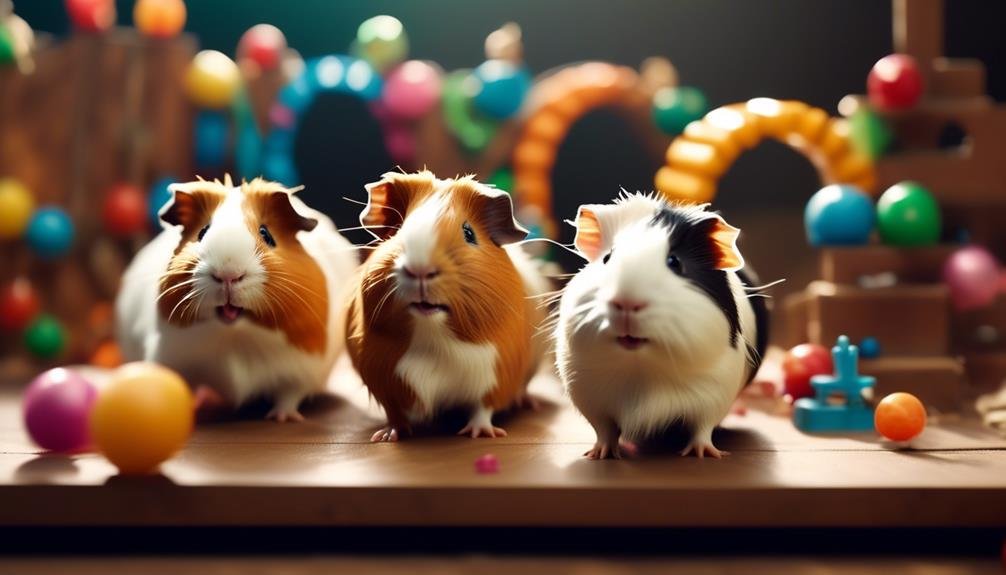
Providing a variety of toys and mental stimulation is crucial for the overall well-being and enrichment of American Guinea pigs. Mental stimulation helps keep them active, prevents boredom, and promotes their natural behaviors. Here are some examples of toys and activities that can provide mental stimulation for guinea pigs:
| Toy/Activity | Description | Benefits |
|---|---|---|
| Chew toys | Made of safe materials like wood or cardboard | Helps keep their teeth healthy and prevents overgrowth |
| Puzzle feeders | Toys that require problem-solving to access food | Stimulates their minds and provides entertainment |
| Tunnels | Tubes or tunnels for them to explore and hide in | Creates a sense of security and encourages physical activity |
| Foraging toys | Toys with hidden treats or hay for them to search for | Mimics their natural foraging behavior |
| Mirror | A small mirror placed in the cage | Provides visual stimulation and companionship |
Social Nature and Communication
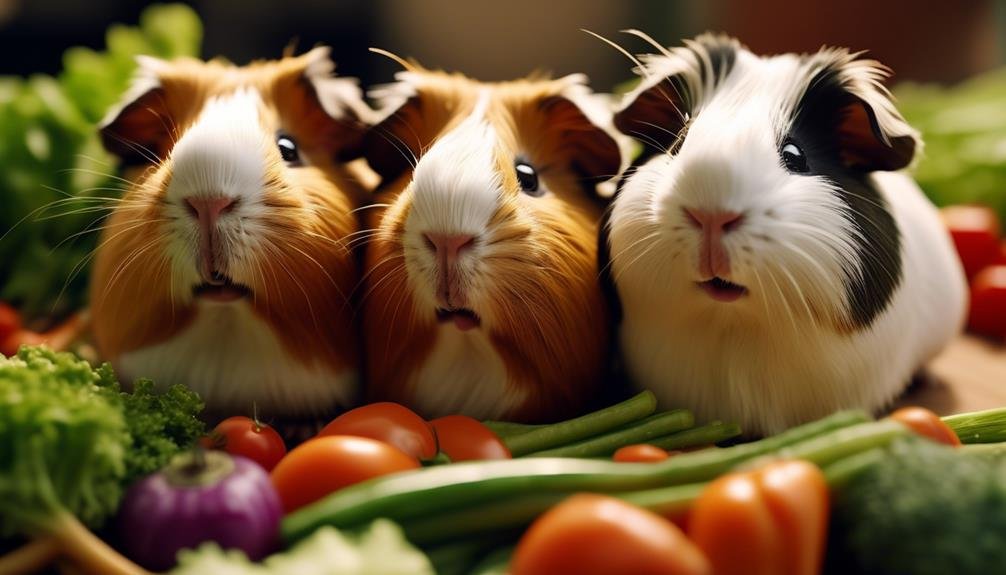
American Guinea pigs are highly social animals that thrive in pairs or small groups. They have a fascinating way of communicating with each other, using a range of vocalizations and body language. Here are three interesting aspects of their social nature and communication:
- Vocalizations: Guinea pigs make various sounds to express their feelings. They may squeak when excited or fearful, purr when content, or rumble when asserting dominance. These vocalizations can provide insight into their emotions and needs.
- Body Language: American Guinea pigs use their bodies to convey messages. They may raise their fur when agitated or scared, flatten their bodies to show submission, or wag their tails when happy. Observing their body language can help understand their moods.
- Interaction with Owners: These charming pets enjoy gentle handling and interaction with their owners. They may nudge or nibble to seek attention or show affection. Bonding with guinea pigs through positive interactions is essential for their well-being.
Understanding the social nature and communication of American Guinea pigs can enhance the bond between owners and their furry companions.
Handling and Interaction With Owners

Owners of American Guinea pigs play a vital role in fostering a strong bond through gentle handling and positive interaction with their furry companions. These small, sociable creatures thrive on human interaction and enjoy being gently stroked and held. Regular handling helps to build trust and familiarity, making the guinea pig feel safe and secure in the presence of its owner.
Owners should approach their guinea pigs calmly and speak softly to avoid frightening them. It is important to support the guinea pig’s body properly when picking it up, as they have delicate spines. Additionally, offering treats and engaging in interactive play sessions can further enhance the bond between owner and pet.
Health Care and Maintenance
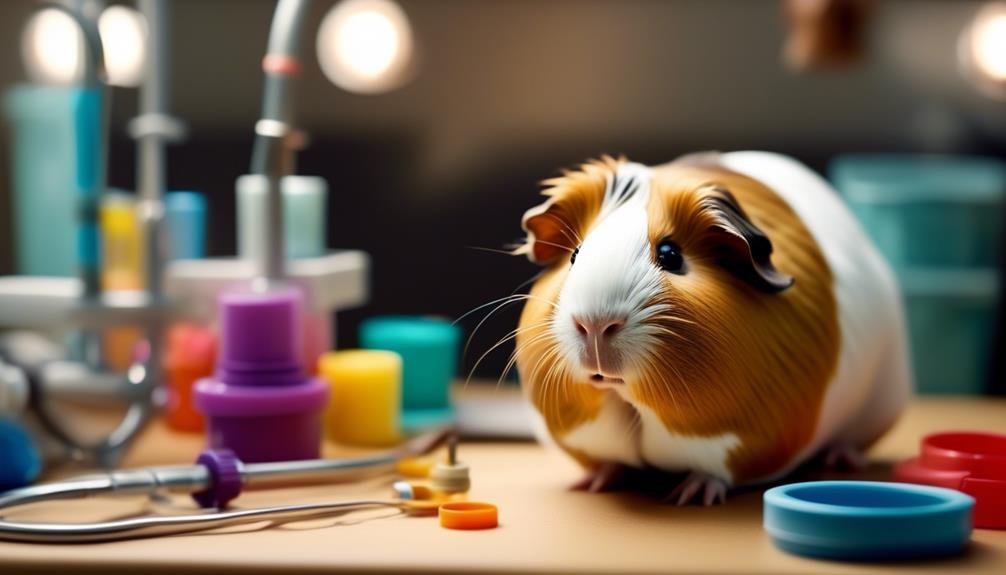
To ensure the well-being of American Guinea pigs, it is essential to prioritize their health care and maintenance. Here are some important aspects to consider:
- Veterinary check-ups: Regular visits to the veterinarian are crucial for detecting any health issues and ensuring the overall well-being of your guinea pig.
- Dental care: Guinea pigs’ teeth continuously grow, so it is important to provide them with appropriate chew toys and monitor their dental health.
- Nail trimming: Regularly trimming your guinea pig’s nails is necessary to prevent overgrowth and potential injuries.
- Spot cleaning: While bathing is not necessary, spot cleaning may be required to maintain cleanliness and prevent any skin issues.
- Exercise: Providing your guinea pig with ample opportunities for exercise is essential to maintain a healthy weight and prevent obesity.
Frequently Asked Questions
How Do You Introduce a New Guinea Pig to an Existing Guinea Pig?
When introducing a new guinea pig to an existing one, it is important to do so gradually. Start by placing their cages next to each other, allowing them to become familiar with each other’s scent before attempting supervised face-to-face interactions.
What Are Some Common Dental Issues That Guinea Pigs May Experience?
Some common dental issues that guinea pigs may experience include overgrown teeth, malocclusion, and dental abscesses. Regular veterinary check-ups, a proper diet, and providing appropriate chew toys can help prevent and manage these issues.
How Often Should a Guinea Pig’s Nails Be Trimmed?
Guinea pigs’ nails should be trimmed every 4-6 weeks to prevent overgrowth and discomfort. Regular nail trims are crucial for their well-being and can be done at home or by a veterinarian.
Are There Any Specific Health Concerns That Guinea Pig Owners Should Be Aware Of?
Guinea pig owners should be aware of specific health concerns such as dental issues due to continuous tooth growth, the need for regular veterinary check-ups, and the importance of exercise to prevent obesity.
What Are Some Signs That a Guinea Pig May Be Overweight and in Need of More Exercise?
Signs that a guinea pig may be overweight and in need of more exercise include a round and bulging abdomen, difficulty moving or breathing, decreased activity levels, and a lack of interest in food.
How Do American Guinea Pigs Differ from Abyssinian Guinea Pigs?
American guinea pigs and Victorian England’s unique Abyssinian guinea pig differ in various aspects. The Victorian england’s unique Abyssinian guinea pig has a distinct coat, with swirls or rosettes, whereas American guinea pigs have a smoother coat. In terms of personality, Abyssinian guinea pigs tend to be more energetic and vocal, while American guinea pigs are generally calmer. Their origin and breeding standards also contribute to the differences between these two popular guinea pig breeds.
Conclusion
In conclusion, American Guinea Pigs have captured the hearts of pet enthusiasts worldwide with their friendly nature, wide array of coat types and colors, and charming physical features.
Proper housing, care, and social interaction are crucial for their well-being. With a lifespan of 5-7 years, these delightful creatures require regular veterinary check-ups, dental care, and exercise.
Overall, American Guinea Pigs are wonderful pets that bring joy and companionship to their owners.




